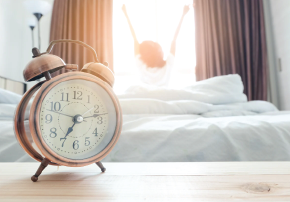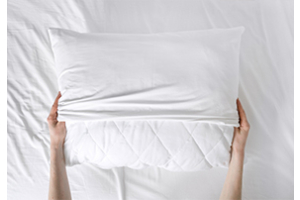Why Some Of Us Sleep And Wake Earlier

Why Some Of Us Sleep And Wake Earlier.
Rise And Shine. Why Some Of Us Sleep And Wake Earlier.
The earlier we get to bed, the earlier we’ll likely wake up. But is it really beneficial to be an early riser? And what time do we mean by early? Here we look into why many people benefit from sleeping and waking up early. Interestingly, it is not so much a choice as a natural disposition. Let’s take a closer look.
What time is early sleeping and waking?
On average we should schedule 7-9 hours of good quality, uninterrupted sleep every night. Work backwards according to the time you aim to wake up. If it’s 5 o’clock, you’ll want to be asleep by between 8 and 10 o’clock the previous evening. If 6 o’clock is your wake-up call, then no later than 9 to 11 o’clock is bedtime. Ideally, you want to be well relaxed and ready for sleep by your appointed hour, so take a half hour before to wind down and get snug in bed, ready for sleep.
What if you’re not an early sleeper and riser?
We all know those happy, bouncy “good morning” people. For those of us who prefer a gentler, later rise in the morning, they can be quite irritating. As Sleep Scientist Dr Dale Rae notes, “Some of us are naturally early sleepers and risers. We compare those people to ‘early morning larks’. Others that like to keep later hours we refer to as ‘night owls’. There is nothing wrong with either preference, as long as we schedule the right amount of good quality sleep. In fact, sleeping in sync with your body clock is key. That is – larks do better on an early sleep-wake schedule, while owls are far better suited to a later pattern of sleep and wakefulness.”
But we need to consider our life demands too. If you have a young family, you will probably need to be on an earlier sleep schedule so that you are up and ready, managing the kids and breakfast before the school run. Do you have a teenager that is habitually sluggish in the mornings? Teenagers tend to stay awake later, often well past their official bedtime. If you’re a work commuter, you probably have a traffic window by which time you need to be on the road, or be late for work. Finding a schedule that suits both your body clock and your life demands is tricky – but well worth the effort. Continually sleeping against your body clock is not only exhausting, but it can impact your mood, performance at work or school, and your long-term physical health.
Can you shift to an earlier sleep-wake pattern?
It is possible to shift your circadian rhythm, or natural body clock, so that you sleep and wake earlier – but only to a point. We can think of our natural tendency towards being a night owl or morning lark as being a spectrum, with “neither-types” in the middle (these are the people with an approximately 11pm – 7am sleep-wake pattern). It is possible to shift your body clock a little earlier or later along this spectrum – say from a neither-type to a moderate morning-type. But you will never be truly comfortable with giant leaps – such as a definite night owl trying to adapt to an early morning schedule.
Can sleeping and waking up early improve your mood?
“An earlier sleep-wake pattern, so that you have a few extra hours to yourself in the early morning, can make a significant difference to your day – but only if you are a morning person!” says Dr Rae. “Early sleepers and risers tend to be more energized and focused throughout the morning.” Early morning routines might include exercise, work requiring quiet thinking time, house chores, organizing the family, or reviewing your daily schedule. Feeling more in control of your day can help to manage anxiety and stress when things get really busy.
Are people who wake earlier smarter?
In a word, no. It is not a given that early morning eager beavers are more intelligent. What can make a difference is a state of alertness that helps with organizing and solving problems. They are therefore likely to be more efficient at daytime pursuits.
Are early risers typically more productive?
Studies suggest that people who are naturally disposed to sleeping and waking earlier can manage and complete tasks more efficiently in the earlier hours of the day. This is when you are likely more alert and sharper. Important things that require attention and input are probably best scheduled for the earlier part of the day. As the afternoon and early evening approaches, you might allocate more mundane things to do like admin or menial chores.
Is sleeping and waking earlier healthier for “early birds”?
“Absolutely – if you are a true morning-type,” says Dr Rae. “Both sleeping in sync with your body clock and getting enough good quality sleep are key. Getting the right type and amount of sleep every night is what regenerates the body and mind. Your physical and mental health will benefit from the right amount of sleep every night, in sync with your “early bird” nature.”
The earlier you get to Dial•a•Bed, the better.
Are you finding it difficult to wake up in the morning? When last did you check the quality of your mattress? Mattresses typically need to be replaced every 8 years. The quality of your sleep, every night, whether you’re a “morning lark” or a “night owl”, is critical to a healthy, rewarding lifestyle. Decide on your budget and price range at www.dialabed.co.za. Everyone can afford their best night’s sleep with Dial•a•Bed. #SleepForLife.






